|
The mineral water industry
Water from Bourne's underground springs has been famous for centuries
and was even being exported 300 years ago. The Stamford Mercury
reported on 13th August 1724 that a list of goods imported into London the
previous week included 129 bottles of Bourne water from Holland,
presumably being brought back to this country after being sold on the
Continent.
But
it was enterprising businessmen during Victorian times who realised that Bourne's water was an asset to be exploited and
were soon marketing the abundant natural supplies that were available under the town
on a very large scale. In 1845, Mr. Robert Mason Mills purchased a chemist and druggist's shop in West Street and in 1864 began the bottling of aerated
mineral water in a factory behind the premises under the name of
R M Mills & Co., a name that continued in use until 1934 when
it became Mills Bourne Waters.
Water for the bottling and aeration process was also drawn from a borehole
that had been sunk in North Road by the newly-formed Bourne Waterworks
Company in 1856 by natural artesian pressure and the company, Bourne Waters, was given a seal of approval when it was granted a Royal Warrant by
Queen Victoria's son, HRH the Duke of Connaught.
|
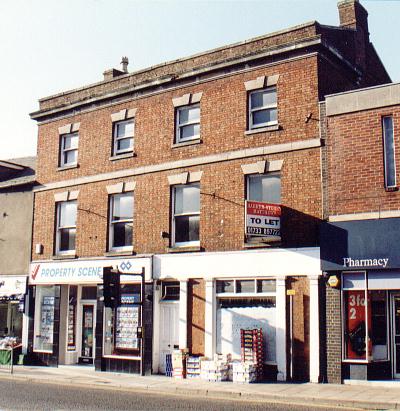 |
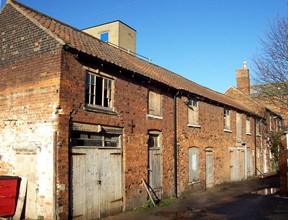 |
|
No 1 West Street from the front and the former
stables and workshops at the rear. |
The business continued until 1878 when Mr Thomas Moore Baxter, who was born in Wisbech but had practised as a chemist in Brighton,
bought the chemist's shop and on the death of Mr Mills in 1904, he also took over the aerated water business
but retained the name of R M Mills and Company.
He
had married Mr Mills' only daughter Emily and their son Mr Cyril Baxter eventually joined the company. In the early years of this century, the firm was manufacturing a dozen aerated beverages using flavouring extracts from various roots and herbs and special medicinal waters were also being made from doctors' prescriptions. When Thomas Baxter died
in 1920, his obituary notice in the local newspaper emphasised that the
firm's aerated waters were still widely popular, even at royal tables.
|
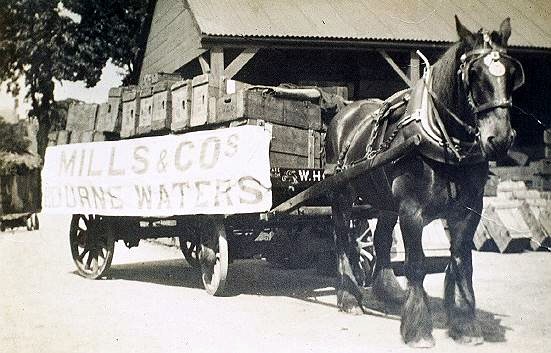 |
|
Robert Mason Mills had a reputation for supporting all public
events and
good causes and one of his company's carts advertising
Bourne Waters
is seen above, most probably taking part in a parade
or carnival in the town, while
one of his famous glass torpedo
bottles from 1900 is pictured below, 7 ins. long,
made of light
green glass and embossed with the name R M Mills & Co.,
Bourne, and
(bottom) an advertisement from 1909 detailing his products. |
|
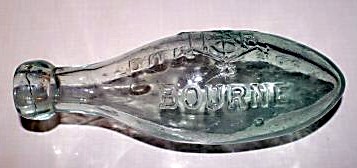 |
|
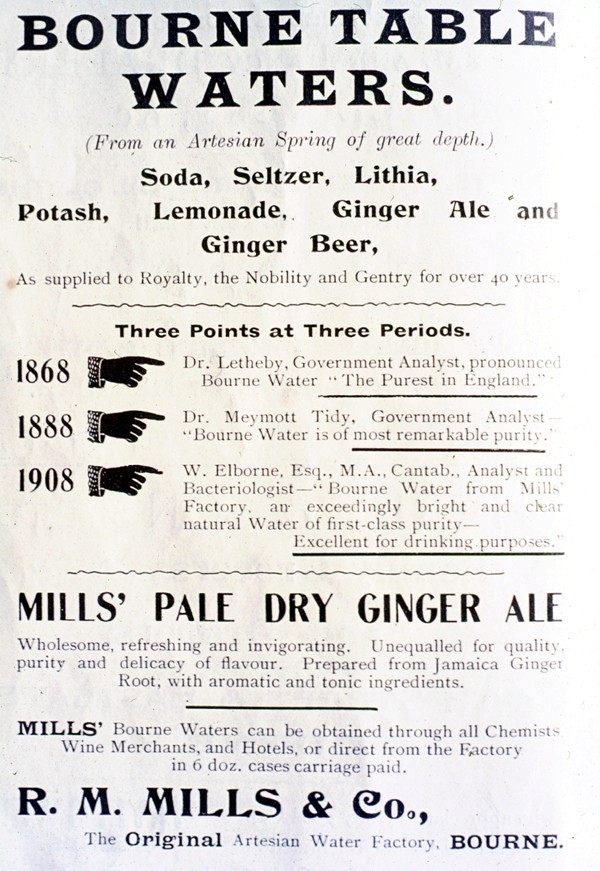 |
Cyril
Baxter succeeded his father in running the business but owing to ill
health, he took Mr Percy Dawson into partnership, a man who had been with the firm since
1921. By 1934, the mineral water department became a limited company trading as Mills Bourne Waters Ltd.
Table waters from the town were advertised as "the purest in England from an artesian spring of great depth" and supplies were despatched by horse and trailer from a depot in South Street which is now a public car park, although there were also deliveries by the company's own motor vehicle.
|
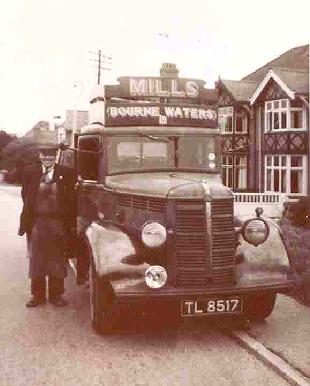 |
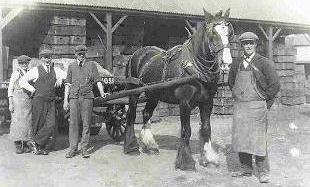
|
|
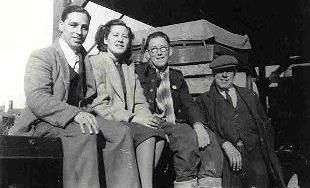 |
|
Glimpses of Mills Bourne Waters from 1950.
The delivery lorry is pictured (left) in West Road with driver Bill
Riley. Loading up supplies at the railway station (top right) with
an unknown lad, G Barnatt, Bill Riley and Percy Cox and some of the
staff (below) at the supply plant, unknown, Ethel Markham. Alex
James and Bill Riley. |
Another firm to bottle water was Lee and Green Ltd who set up a bottling
plant at the Old Theatre premises in Abbey Road in 1891 (pictured
below). Their water was drawn from a bore on the premises that was almost
100 feet deep and one of their advertisements from the turn of the century
proclaimed: "As the beauties of nature appeal to the eye, so the exquisite
flavour of Lee and Green's Dry Ginger Ale charms the palate".
|
 |
The
company soon became well known for its products. The Lincolnshire Free
Press reported on 12th June 1894:
"The fame of Bourne mineral
waters, in which Messrs Lee and Green take a prominent place, is known
over a wide and still extending radius. Before the firm established its
business in Bourne, the town had already become noted for the unequalled
purity and abundance of its water. They were convinced that by the
application of the latest improvements and inventions, there was abundant
room to develop the industry. From an inspection of the piles of boxes
directed, not only to parts of Lincolnshire and adjoining counties, but
also to London, Brighton, Shrewsbury, Stafford etc, we noticed every
variety of water - sodas, potass, lemonade, lithia, ginger ale and orange
champagne - all manufactured solely at the Bourne factory." |
Lee
& Green were originally founded in Sleaford but soon had factories in
not only Bourne but also Spalding, Skegness, Boston and an office in Syracuse,
USA, becoming a limited company in 1902 with the founders, George Ranyard
Lee and Arthur Green, appointed joint managing directors and Sir John Gleed
as chairman. In 1901, the Old Theatre was partly rebuilt and the new
building marked with a stone "L & G 1901" with a small niche above
containing a Lee and Green bottle. The western gable of the building also
contained decorative work involving the insertion of various types of the
company's glass bottles into the wall. The business continued to expand
and an additional bore was sunk in 1905 to supply extra water to meet the
demand at the Bourne plant and at the newly opened factory at Skegness,
via a railway tanker. Trade appears to have been dependent on hot summers
with poor company results whenever
the season was wet and cold.
The
business remained open until production ceased in June 1934 when the
manufacture of mineral waters ceased. The premises were sold that year to
the agricultural engineer W M Friend and then after a spell as a builder's
merchants, the buildings were demolished in February 1989 to make
way for the town's new off street market place and adjacent car parking
area but since those days of high water production and distribution, many
of the company's old bottles have been dug up in gardens and building
sites around the town.
|
WHAT THE NEWSPAPERS WERE SAYING |
|
From small beginnings at Sleaford, the firm of
Lee and Green has by energy and enterprise developed into an
important business with admirably equipped plants at Spalding,
Sleaford and Bourne. The new year is being inaugurated with still
more progress. The firm have purchased the business being conducted
by Mr W Rowley of Skegness. They have acquired the premises and are
establishing a new plant thoroughly up to date with every modern
mechanical requisite. The high reputation Messrs Lee and Green have
deservedly acquired is a guarantee of the success of their new
venture.
The appliances and arrangements for their manufacturing processes
are so perfect and the demand for their aerated waters so great that
the popularity of their products at the new Skegness establishment
is a foregone conclusion. We note that to be absolutely secure of an
absolutely unfailing supply of Bourne water, the firm are sinking on
their premises at Bourne a new well with a larger bore and deeper
that from the well whence the existing supply is derived. This
supplementary source will allow them to cope with the larger demand.
The water is transported to Skegness by railway tanker. -
Lincolnshire Free Press, January 1899.
Up to date business enterprise: Mr Arthur Green
of the well known firm of Lee and Green, aerated mineral water
manufacturers, sails on March 7 by the Oceanic for New York to open
a new factory just outside the city, at Syracuse. The firm have
secured the services of Mr Nelson Anderson as manager for the
American branch which there is every reason to anticipate will
develop into a flourishing centre for the continued extension of
Messrs Lee and Green's prospering and enterprising business. The
excellence and yearly increasing demand for their popular
specialities is a matter for hearty congratulation. - Lincolnshire
Free Press, March 1900.
DEATH OF MR WALTER GREEN: We regret to have to
record the death of Mr Walter Green, which took place on Saturday
morning last at his residence on the North Road. For some time past,
Mr Green [aged 43] had been in failing health, but up to about six
weeks ago he was able to attend to his duties as manager of Messrs
Lee and Green's mineral water factory at Bourne. The cause of death
was dropsy, for which he had undergone an operation about a
fortnight previous. A week before his decease, he was out in a
conveyance, but on returning home he was compelled to take to his
bed and was not able to leave it again. His condition on Friday was
such that the members of the family were communicated with and death
occurred at eight o'clock on Saturday morning. Mr Green came to
Bourne some ten years ago, from Sleaford, to take over the
management of the factory in lieu of his brother who was about to
work at a similar concern at Spalding belonging to the firm.
Deceased was a member of the Hereward Lodge of Freemasons and also
of the local Lodge of Buffaloes and always took an active part in
such local functions as the Whit Monday sports, the flower show etc.
In politics, Mr Green was a staunch Conservative and assisted in all
the elections, whether Parliamentary or parochial. The funeral took
place on Tuesday amid many manifestations of sympathy with the
bereaved family. Along the route which the cortege had to travel,
the blinds of private houses were drawn and the business houses were
closed. A goodly number of the Hereward Lodge of Freemasons and of
the Buffaloes joined the procession in the Market Place and preceded
the hearse. Immediately behind them was a conveyance which carried a
splendid array of wreaths including two from the lodges referred to
above. The coffin, supplied by Mr W Hall, was of polished elm. The
service at the cemetery was conducted by the vicar, the Rev H M
Mansfield. - news report from the Grantham Journal, Saturday 12th
October 1901.
|
|
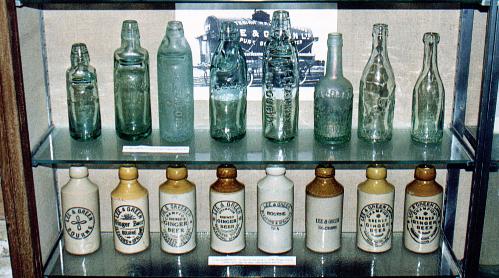 |
|
Bottles used by the
Lee & Green company for the distribution of their product on
display in the Heritage Centre at Baldock's Mill, Bourne (above). These
form part of a collection amassed by Jonathan Smith which now
numbers 58 stone and glass bottles covering various retailers and
breweries, including Arthur Bott, landlord of the Angel Hotel,
grocers, wine merchants and the mineral water manufactories. The
jug on the right, also by Lee & Green, is part of Jonathan's
collection and can also be seen at the Heritage Centre. |
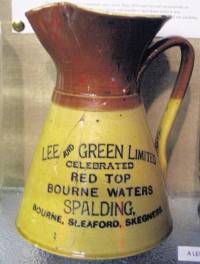 |
Several
other boreholes were sunk at various places around Bourne, particularly
in those areas where users were having difficulties and some of these were
sunk by private individuals. In August 1887, following complaints about
the inadequacy of the supply, a boring was made in the yard at the rear of
the Bull Hotel (now the Burghley Arms), reaching a depth of 93ft 2in and
subsequently producing water at the rate of 170 gallons a minute. The
operation was carried out by the local blacksmith Mr Thomas Nowell at a
cost of £30. In September that year, a borehole was also drilled on Mr
Henry Goodyear's property in the Austerby where it reached a depth of
104ft., despite some technical difficulties with the equipment caused when
it reached a layer of solid rock.
|
There was a rail
link between Bourne and other towns in South Lincolnshire such as
Spalding, Skegness, Sleaford and Boston, where Lee & Green Ltd
had factories and this is the water tanker used to
transport supplies of their famous "Pure Bourne Water". |
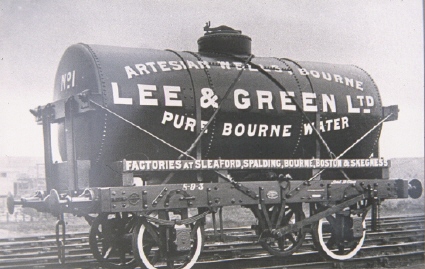 |
The Cake Kabin
at No 65 Abbey Road was formerly the water bottling plant run by the
company W U B & H E Smith (later Smith and Company) and known as the
Old Abbey Road factory, operating circa 1904-1917. This was the third firm to market Bourne's pure water
after R M Mills & Company and Lee & Green Ltd. They followed E W Beckett
from circa 1865 who sold the company, Bourne Waters, to his
brother-in-law, William Henry Palmer, in 1874 (Henry Palmer & Co) when the
business was known as the Steam Mineral Water Works based in in Star Lane
[now Abbey Road]. When Lee and Green Limited bought Smith and Company in
1917, H E (Herbert Edward) Smith was taken on as manager of the Bourne
factory.
|
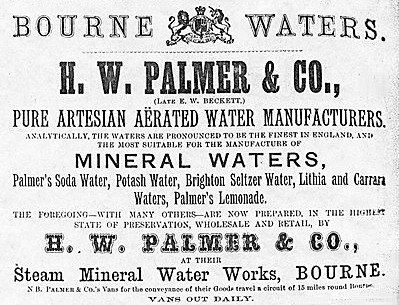 |
This magazine advertisement from Kelly's
Post Office Directory of Lincolnshire for 1876 by H W Palmer and
Company which operated from premises in Abbey Road shows the
diversity of their products and the efficient local delivery service
run by the company. Lemonade and soda water are still marketable
products today but you will search the supermarket shelves in vain
for potash water, lithia and carrara waters. |
| The plant was established around 1904 when the premises were known as the Old Abbey Road factory where the firm specialised in drinks such as American cream soda, lime juice and soda, ginger stout, seltzer, dandelion stout, stone ginger beer and ginger ale "in corked bottles" although all drinks were supplied in syphons when required.
"The best in England - no order too large and none too small", boasted their advertising literature. |
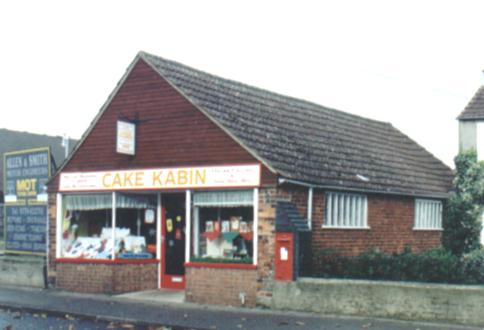 |
The business later became Smith and Co and was still in existence in 1913 although they did not survive long after the Great War and by 1931, one of the original partners H E Smith had become manager at Lee & Green's Old Theatre factory.
A
reminder of E W Beckett's company came in 1959 when a bottle was turned up
during ploughing at Wilsthorpe and was identified by the moulded lettering
on it which said: "E W Beckett's Aerated Mineral Waters, Bourne,
Lincolnshire." The bottle weighed 1 lb. 1 oz. and had the unusual
appearance of a blunt end and could not therefore be stood
up, a deliberate feature of the manufacturing process to ensure that the
bottle was stored on its side to keep the cork moist, much as wine is kept
today, for if the cork dried out and shrank, then the gas from the water
would blow it out. The bottle is now on
display at the Heritage Centre in South Street.
Edwin Walter Beckett married a local
girl, Eliza Ann Palmer, at the Abbey Church in 1867 and after selling the
mineral water company in 1874, moved to Grimsby where he became landlord
of the Black Swan public house, He died at Grimsby on 22nd October 1912.
See also
Memories of the industry Lee & Green - the
American connection

Go to:
Main Index
|













